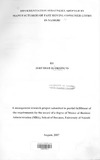| dc.description.abstract | The fast moving consumer goods manufacturers (FMCG) are faced with intensified
competition, consumers who are more value conscious and less brand loyal, dwindling
product life cycles and increasingly powerful retailers; this means that most of the FMCG
products fall by the wayside. Despite the critical nature of the product differentiation
process, very little is known about the differentiation strategies adopted by manufacturers
of fast moving consumer goods. In this industry, products dealt with have close
similarities and therefore, one company‟s products need be differentiated from those of
the other in order to survive in this competitive market. This study therefore needed to fill
the gap by attempting to answer the question: what are the differentiated strategies
adopted by manufacturers of fast moving consumer goods in Nairobi.
This was a descriptive survey aimed at determining the differentiation strategies adopted
and used by manufacturers of fast moving consumer goods in Nairobi. Seventy eight (78)
companies constituted the population of study. A census study was conducted. . Data
was collected using semi-structured questionnaires and was self administered through
drop and pick method (a form of mail questionnaire). Out of the seventy eight
questionnaires distributed, fourty nine (49) respondents managed to fill and return their
questionnaires, translating to a response rate of 62.8%. Data was analyzed using
frequency distributions, percentages, mean scores and standard deviations.
Organizations in the fast moving consumer goods industry should be recommended to
concentrate their efforts in several differentiation strategies. However, these firms should
combine a few of the strategies that are very important in the industry and which cannot
be easily copied by the competitors, since, differentiation of market offerings is the art of
designing meaningful differences to distinguish company offering from those of
competitors (Kotler, 1997). If this is accomplished, it may in turn influence high
customer retention levels, high customer loyalty, premium prices, greater market share
and overall profitability.
The first limitation faced during the research was to get respondents at their work stations
due to field assignments away from their offices. In some instances, more time and
resources were invested in making follow ups. Secondly, respondents‟ apprehension was
very high and it was difficult to get the responsible senior officials to accept to be
interviewed. They viewed the exercise with a lot of suspicion due to the stiff competition
in the fast moving consumer goods industry.
There is adequate opportunity for further research on the differentiation strategies
adopted by manufacturers in other industries, where there are more players and higher
competition. Finally, longitudinal and more controlled studies (field experiments) should
be conducted with a view to establishing “a true” effect of differentiation strategies and
competitive advantage. In the fast moving consumer goods industry, I suggest that a
study should be conducted to establish the challenges faced by manufacturers in initiating
and implementing the various differentiation strategies. This will help marketers to tailor
their differentiation strategies to suit the right product with the right consumers in order
to achieve the overall organizational goals. | en |

